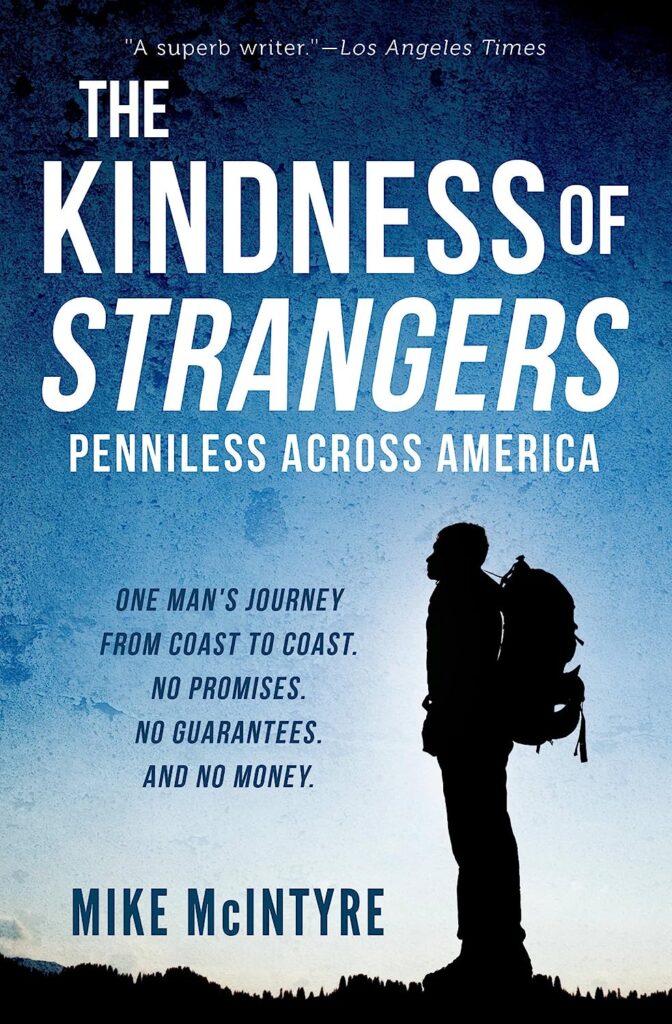Book Review, Mike McIntyre, The Kindness of Strangers: Penniless Across America

In 1994 San Francisco journalist Mike McIntyre got it into his head to try to cross the county with no money. No money whatsoever. With a borrowed 50-70 pound backpack, he traveled literally penniless for 4,223 miles from San Francisco to Cape Fear, North Carolina. That’s fourteen states, 82 rides, five laundry loads, and one golf round. He wondered if the people he met along the way would show kindness to him, provide rides, offer him, or buy him some food, let him sleep in his tent in their backyards for the night, or maybe even in their homes. Along the way, several people tried to press money into his hands or his pocket, but he steadfastly refused (politely) to accept their money. The quest was to see if you could cross the United States without spending a single cent. You can, he did, but it’s not quite Jack Kerouac’s beatific adventure.
McIntyre’s test was successful. John Steinbeck’s Ma Joad was right: “If your [sic] in trouble or hurt or need — go to poor people. They’re the only ones that’ll help — the only ones.” McIntyre got a few rides from well-off people, but they provided no stories that survived into his book. He is continually surprised, even at times alarmed, by how much poor people, who have little, will offer a complete stranger.
The scores of people who gave him rides tended to be individuals who had had difficult lives, had known trouble, and endured setbacks, some severe. His rides came more often from men than women. Still, it was women who tended to bring him into their homes, including several who had had terrible, even violent, previous experiences with strangers.
McIntyre received hospitality from several preachers or former pastors. They were all on the evangelical end of the spectrum, from which they literally and quickly asked him if he accepted Jesus as his personal savior. I wonder if mainline churches and their ministers would have been as friendly? Certainly, most Presbyterian or Lutheran pastors would not have asked him if he had had his encounter with the Nazarene.
The book made me feel queasy. Every time McIntyre accepts a ride, he had to wonder if they planned to rob him, rape him, ransom him, or murder him. Only once in the book does he appear to have dodged that bullet. He’s a little reticent about men who seemed perhaps to hint that they might be willing to engage in a sexual exchange. A few women he met made it clear — or so he thought — that they might share their beds with him. He was attracted to several of these women but determined to remain faithful to his girlfriend back in the Bay Area. If she had dumped him before he embarked on the transcontinental journey, perhaps he would have occasionally accepted that form of hospitality, too. Though just writing that sentence makes me think: that way madness lies.
Most people he met would be classified as “broken” Americans. Perhaps we are all broken differently: divorces, desertions, domestic violence, drugs, depression. People were willing to tell McIntyre their stories, no matter how desperate or discreditable. He usually told them he was on a penniless quest, but not always. It made me sad to think that the people who are most broken are most kind and understanding, and the people doing well accelerate as they pass the hitchhiker. This shouldn’t come as a surprise, but it’s a lesson we need to relearn. What some people he met had been through seems so grave that it’s unclear how they found it possible to go on. Nor does it sound like much fun to be around them, to see and hear their pain. So many of the trusting women had been betrayed (or beaten) by men, and so often, that it makes you sick for humanity. You want to see the human condition in America? Hitchhike across the country.
If you only had the evidence in the book to evaluate, you’d say Americans are kinder, friendlier, and more generous than you might think. They are less fearful. More trusting.
McIntyre met no homophobes on his journey but some victims of homophobia. 1994 was a full generation ago, on the other side of one of American history’s most breathtaking cultural revolutions. I think of the millions of men who lived closeted lives until the last decade or two, who are now free to explore or express their identity in a nation that has come to understand that the choices of consenting adults are nobody’s business but their own.
McIntyre met a fair number of racists. Some willing to spew the n-word in front of a stranger. He got away from such folks as quickly as possible, but when you are hitchhiking, you must take what you get and you are, for the duration of the ride, a captive audience. He met a fair number of people who live outside the IRS economy. He met a couple of criminals, including a perfectly healthy man who stood by the side of the road with a cardboard sign indicating that he was homeless. The man eventually forced a couple of McDonalds’ cheeseburgers into McIntyre’s hands. To his credit, the minute the man drove around the corner, McIntyre threw them into the trash with disgust. As someone who has done some food-deprivation adventures, I know how difficult that must have been. Hunger was a persistent issue for McIntyre.
This is a good book, but it could have been a better book. McIntyre keeps things close to the surface. He repeatedly lets us know that he could depend on the kindness of strangers, but one feels that he left a lot of spiritual possibility on the table. He does not join such writers as Jack Kerouac (On the Road) or Lease Heat-Moon (Blue Highways), or Robert Pirsig (Zen and the Art of Motorcycle Maintenance) in using a journey story to ask and attempt to answer some big questions. With Least Heat Moon, Pirsig, or Steinbeck, you feel yourself in the presence of a big soul and a fine prose stylist. They would not settle for the basic narrative that McIntyre provides, which makes his great adventure — for truly it was great — seem more like a feat than a spiritual journey.
